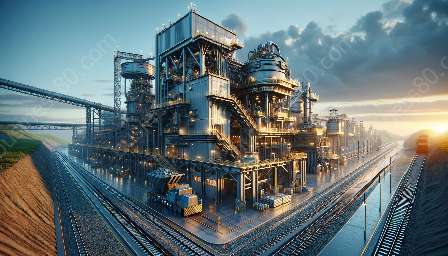Metallurgy is a captivating field that encompasses the science, technology, and business of metals, mining, and industrial applications. From mining raw materials to shaping them into valuable products, metallurgy is an essential aspect of the modern world.
The Fundamentals of Metallurgy
Metallurgy is the study of the physical and chemical behavior of metallic elements, their intermetallic compounds, and their mixtures, which are known as alloys. It involves understanding the properties of metals and their behavior under various conditions, such as temperature, stress, and environment.
Metallurgy plays a crucial role in various industries, including manufacturing, construction, aerospace, automotive, and energy production. Its impact extends from the extraction of raw materials to the design and production of advanced metal components.
Metals & Mining: From Exploration to Extraction
Metals & mining form the foundation of metallurgy. The process begins with the exploration of mineral deposits, where geologists and mining engineers identify potential sites for extracting metals and ores. This exploration phase involves extensive research, surveying, and geological analysis to assess the feasibility of mining operations.
Once a mineral deposit is identified, the mining process begins, involving various techniques such as surface mining, underground mining, and seabed mining. These methods aim to extract valuable minerals and metals from the earth's crust, often involving the use of heavy machinery, drilling, and extraction technologies.
Efficient mining operations are essential to ensure the sustainable extraction of minerals while minimizing environmental impact. Technologies such as automated mining equipment, sensor systems, and advanced drilling methods have revolutionized the metals & mining sector, making extraction processes safer and more efficient.
The Art and Science of Extractive Metallurgy
Once raw materials are extracted from mines, they undergo a series of processes known as extractive metallurgy to extract and refine the desired metals. This involves crushing, grinding, and concentrating the ores to separate the valuable components from the impurities.
Extractive metallurgy also encompasses various techniques such as smelting, roasting, and leaching, which aim to extract the metals from the ore through chemical and physical transformations. These processes require a deep understanding of thermodynamics, kinetics, and chemical reactions to achieve high-purity metal products.
Furthermore, sustainability and environmental considerations have become integral to modern extractive metallurgy, driving the development of greener processes, recycling technologies, and waste management strategies to minimize the environmental impact of metal extraction and refining.
Business & Industrial Applications of Metallurgy
Metallurgy directly influences the business and industrial sectors by providing essential materials for manufacturing, construction, and various industrial applications. From structural steel to advanced alloys, metallurgical advancements have enabled the development of high-performance materials that are integral to modern infrastructure and technology.
The business of metallurgy involves the production, distribution, and marketing of metal products, as well as the development of innovative materials with enhanced properties such as strength, corrosion resistance, and conductivity. Metallurgical companies play a vital role in driving technological advancements and contributing to the global economy.
The Future of Metallurgy: Innovations and Challenges
The field of metallurgy continues to evolve with ongoing research and development. Innovations in materials science, nanotechnology, and additive manufacturing are reshaping the possibilities of metal utilization, paving the way for lightweight and high-strength materials with diverse applications.
Challenges such as resource scarcity, environmental impact, and energy consumption are driving the need for sustainable metallurgical practices. Researchers and industry experts are exploring alternative raw materials, efficient recycling processes, and energy-efficient smelting technologies to address these challenges and ensure the long-term sustainability of metal production and utilization.
Conclusion
Metallurgy stands at the intersection of science, industry, and business, shaping the modern world through the exploration, extraction, and utilization of metals. Its impact extends across diverse sectors, driving innovation and economic growth while addressing the challenges of sustainability and environmental responsibility.

